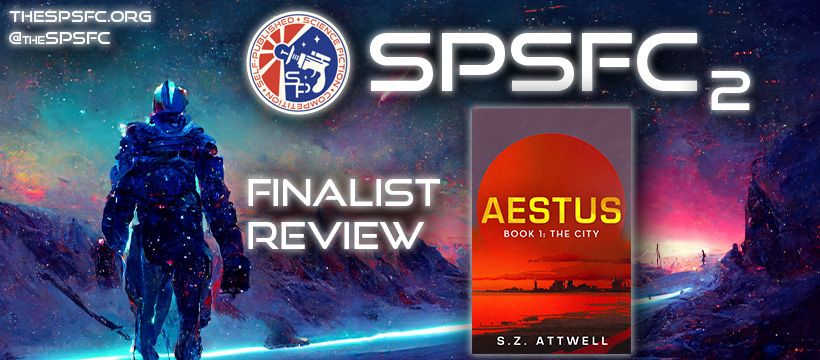Author: S.Z. Attwell
Author Twitter: @szattwellauthor
Book Links: Amazon | Goodreads
Genre: Adventure / Dystopian / Climate Fiction
Word Count: 161,700
Aestus: Book 1: The City by S.Z. Attwell plunges into a dystopian narrative with a gripping setup: a subterranean city on an overheated Earth, teetering on the edge of survival. On the surface, green-eyed entities known as Onlar grow increasingly dangerous, and belowground resources are running low. It's a twisty tale that kept me turning the pages, though certain elements somewhat marred the experience.
First, the positives: Attwell's world-building is impressive and delivered without excessive exposition or hand holding. Information surfaces naturally through the course of the story, letting my understanding of the world expand as the protagonist herself discovers more. I love when characters realize the world is bigger and more complex than they thought, and this book does that well.
Another thing the book does well: pacing. While perhaps more could have been done to trim this 700-page book down, the plot kept a fast pace with exciting twists and turns (even if I did spot some of them coming from miles away).
Some of this fast-paced feeling surely comes from the author's unusual choice to break up this long book into many very short chapters. I don't know what it is about human psychology, but that little trick had me thinking, 'Just one more chapter' over and over again. Some people may find this distracting, but I didn't mind, as it definitely helped me read the book more quickly.
Unfortunately, I struggled with the characters and the writing style in Aestus. Jossey, the protagonist, consistently frustrated me throughout the narrative. Despite being a 25-year-old dealing with a post-apocalyptic setting, she seemed much younger for her lack of competence. The ways she interacts with other characters felt equally immature, as though she belonged in a YA novel instead. At times, the plot also leaned into some YA tropes, such as when the character is in training and has to stand up to her bully. That younger tone was something I personally didn't enjoy.
Similarly, the writing style felt too distanced from Jossey's and the other POV characters' perspectives. There were too many phrases like "she thought", "she could feel", and "she could see", making it hard to settle into Jossey's head and making emotional moments fall flat.
The novel also stumbles slightly with Jossey's technologically solved problems, which, to me, lacked depth and complexity. For example, she develops a new vital technology for the city in just a day if I recall correctly, with no errors in the design—it felt too convenient to me. I could have accepted it if Jossey was characterized as some sort of engineering genius, but instead it seemed like these details were skimmed past to keep up the plot's rapid pace.
In conclusion, Aestus offers an intriguing premise and a well-crafted world, though its characterization and narrative voice pulled it too far into the YA spectrum for my personal tastes. For those unbothered by those elements, the book is worth checking out for an entertaining journey into a uniquely realized dystopian society.
My Score: 6.5 / 10
/* Note: I'll be keeping my review score hidden until the rest of Team ScienceFiction.news can announce their scores as well. This review reflects only my personal opinion, not the opinion of the entire team. */


